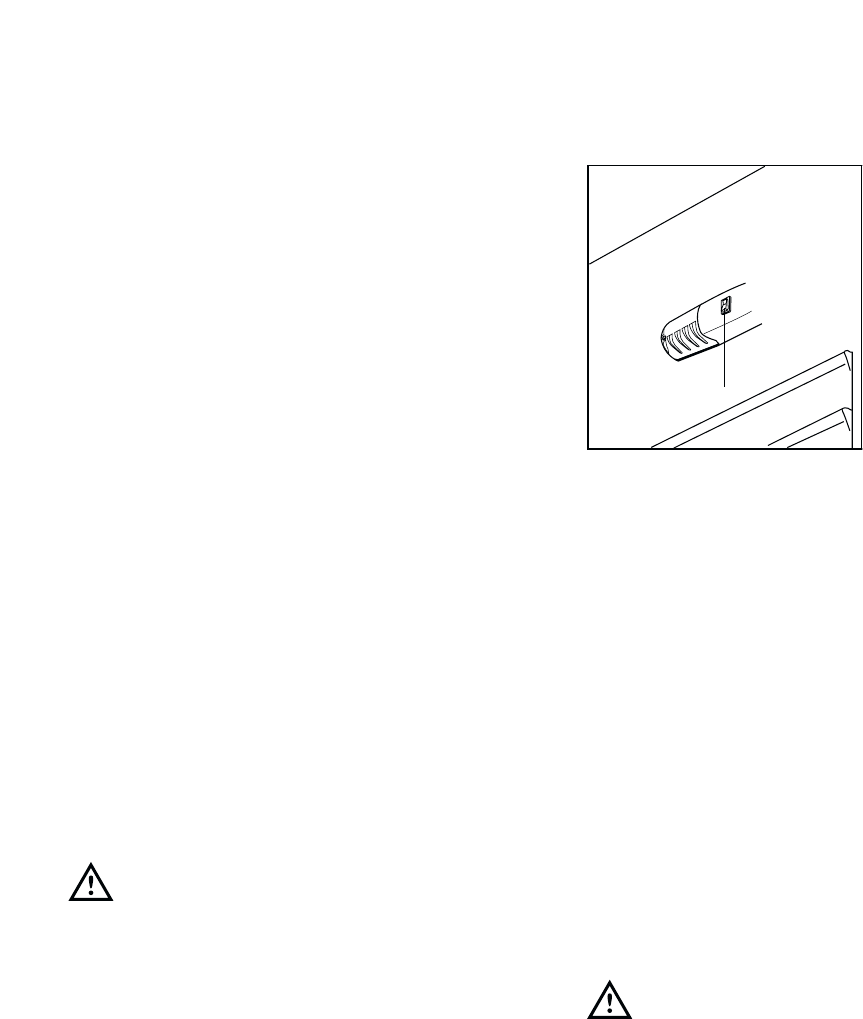
5
OPERATION
Before using
Remove all securing tapes. Wash inside the
appliance with lukewarm water and bicarbonate of
soda (5 ml to 0.5 litre of water).
Do not use soap or detergent as the smell may
linger. Dry thoroughly.
Setting the temperature
The temperature inside the refrigerator is regulated
by a thermostat with 6 temperature positions and an
“OFF” (O) position.
Position 1 = minimum coldness
Position 6 = maximum coldness
Turn the thermostat dial to the required position.
The intermediate position is usually the most
suitable (3-4).
The thermostat setting can vary as the temperature
inside the refrigeration compartment depends on the
following factors:
– room temperature
– how often the door is opened
– how much food is stored
– position of the appliance
Important
During prolonged periods of abnormally hot weather,
if the thermostat is set on too high a number, the
cooling system may operate continuously and the
fridge cooling plate may not defrost. Turning the
knob to a lower number will cause the automatic
defrosting to resume.
Low Room Temperature Switch
To ensure that the appliance is working efficiently
when the room temperature drops below 16°C, the
switch mounted next to the thermostat control should
be switched on.
No damage can be caused by leaving the switch in
this position for any period of time (see page 11 Low
ambient operation). However should the temperature
rise above 16°C remember to turn the switch off
again.
The freezer compartment
The four-star freezer compartment is suitable for
storage of commercially frozen food and for freezing
fresh foods.
A - Low Room Temperature Switch
D710
A
Freezing fresh food
It is not necessary to adjust the thermostat setting
when freezing fresh food. Depress the ambient
switch at least 24 hours before loading food to be
frozen.
In any 24 hours you can freeze up to 6 kg. of fresh
food.
Place food to be frozen in the bottom drawer of the
freezer as this is the coldest part.
Important
In the event of a power cut do not open the door.
The food in the freezer will not be affected if the
power cut is short and if the freezer is full. Should
the food begin to thaw, it must be consumed quickly
and must not be re-frozen .
16
Electrical connections
Any electrical work required to install this appliance
should be carried out by a qualified electrician or
competent person.
WARNING: THIS APPLIANCE MUST BE
EARTHED.
The manufacturer declines any liability should
this safety measure not be observed.
If the plug that is fitted to your appliance is not
suitable for your socket outlet, it must be cut off and
the appropriate plug fitted.
Remove the fuse from the cut off plug.
The cut off plug should then be disposed of to
prevent the hazard of shocks in case it should be
plugged into a 13amp socket in another part of your
home.
Important
The wires in the mains lead are coloured in
accordance with the following code:
Green and Yellow - Earth
Blue - Neutral
Brown - Live
If you fit your own plug, the colours of the wires in
the mains lead of your appliance may not
correspond with the markings identifying the
terminals in your plug, proceed as follows:
Connect the Green and Yellow (earth) wire to the
terminal in the plug which is marked with the letter
«E» or the earth symbol or coloured green and
yellow.
Connect the blue (neutral) wire to the terminal in the
plug which is marked with the letter «N» or coloured
black.
Connect the brown (live) wire to the terminal in the
plug which is marked with the letter «L» or coloured
red.
D207
GREEN & YELLOW
13 AMP. FUSE
BROWN
CORD CLAMP
BLUE
13 AMP
The plug moulded onto the lead incorporates a fuse.
For replacement, use a 13amp BSI362 fuse. Only
ASTA or BSI approved fuses should be used.
The plug must not be used if the fuse cover/carrier is
lost. The cover/carrier is indicated by the coloured
insert at the base of the plug.
A replacement cover/carrier must be obtained from
your local Tricity Bendix Service Force Centre.
This appliance complies with the E.E.C. Directive
No. 87/308 of 2.6.87 relative to radio interference
suppression.
This appliance complies with the following
E.E.C. Directives:
- 73/23 EEC of 19.2.73 (Low Voltage Directive)
and subsequent modifications;
- 89/336 EEC of 3.5.89 (Electromagnetic
Compatibility Directive) and subsequent
modifications.
Please ensure that when the appliance is
installed it is easily accessible for the engineer in
the event of a breakdown.


















